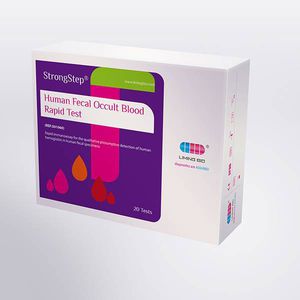
- Laboratory
- Laboratory medicine
- Rapid sepsis test
- Nanjing Liming Bio-products Co., Ltd.

- Company
- Products
- Catalogs
- News & Trends
- Exhibitions
Rapid procalcitonin test 502050sepsisproteinPCT
Add to favorites
Compare this product
Characteristics
- Applications
- sepsis
- Tested parameter
- protein, procalcitonin, PCT
- Sample type
- serum, plasma
- Analysis mode
- molecular
- Format
- strip
- Result display time
15 min
Description
The StrongStep® Procalcitonin Test is a rapid immune-chromatographic assay for the semi-quantitative detection of Procalcitonin in human serum or plasma. It is used for diagnosing and controlling the treatment of severe, bacterial infection and sepsis.
INTRODUCTION
Procalcitonin(PCT) is a small protein that comprises 116 amino acid residues with a molecular weight of approximately 13 kDa which was first described by Moullec et al. in 1984. PCT is produced normally in C-cells of the thyroid glands. In 1993, the elevated level of PCT in patients with a system infection of bacterial origin was reported and PCT is now considered to be the main marker of disorders accompanied by systemic inflammation and sepsis. The diagnostic value of PCT is important due to the close correlation between PCT concentration and the severity of inflammation. It was shown that "inflammatory"PCT is not produced in C-cells. Cells of neuroendocrine origin are presumably the source of PCT during inflammation.
PRINCIPLE
The StrongStep® Procalcitonin Rapid Test detects Procalcitonin through visual interpretation of color development on the internal strip. Procalcitonin monoclonal antibody is immobilized on the test region of the membrane. During testing, the specimen reacts with monoclonal anti-Procalcitonin antibodies conjugated to colored particles and precoated onto the conjugate pad of the test. The mixture then migrates through the membrane by capillary action and interacts with reagents on the membrane. If there are sufficient Procalcitonin in the specimen, a colored band will form at the test region of the membrane. The presence of this colored band indicates a positive result,
Catalogs
No catalogs are available for this product.
See all of Nanjing Liming Bio-products Co., Ltd.‘s catalogsOther Nanjing Liming Bio-products Co., Ltd. products
Others
Related Searches
- Assay kit
- Solution reagent kit
- Blood rapid diagnostic test
- Diagnostic reagent kit
- Rapid lateral flow test
- Immunoassay rapid diagnostic test
- Molecular test kit
- Cassette rapid diagnostic test
- Rapid virus test
- Respiratory infection test kit
- Serum rapid diagnostic test
- Plasma rapid diagnostic test
- Histology reagent kit
- Infectious disease rapid diagnostic test
- Whole blood rapid diagnostic test
- COVID-19 detection kit
- Rapid respiratory infection test
- Real-time PCR test kit
- Urine rapid diagnostic test
- Clinical reagent kit
*Prices are pre-tax. They exclude delivery charges and customs duties and do not include additional charges for installation or activation options. Prices are indicative only and may vary by country, with changes to the cost of raw materials and exchange rates.



